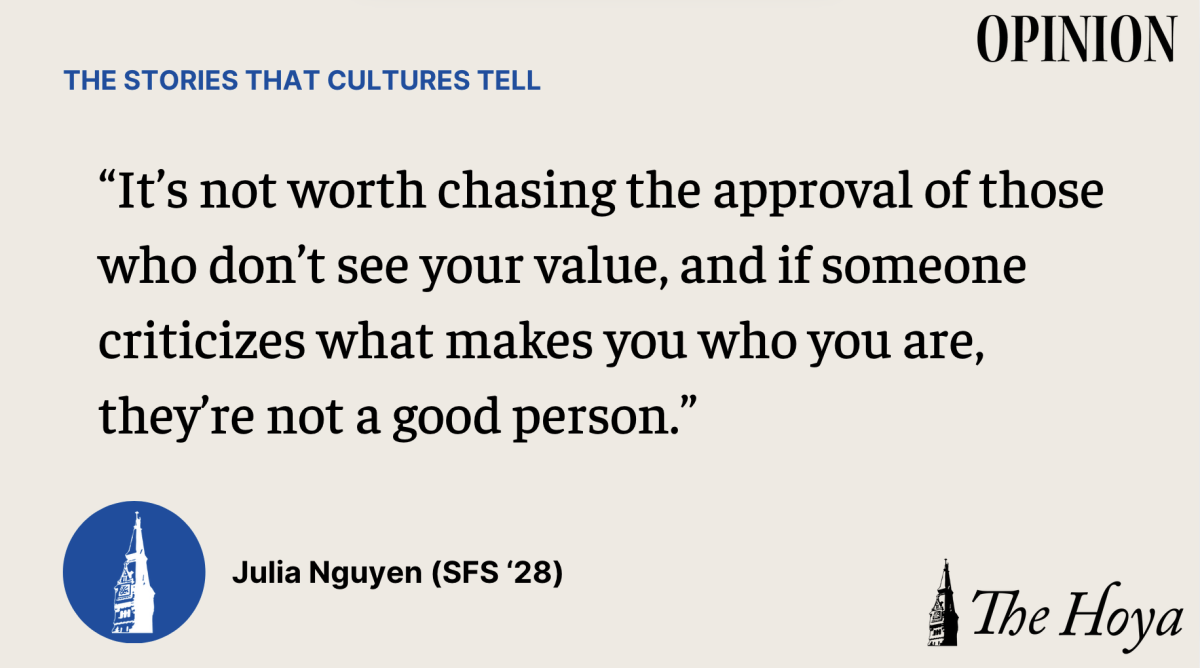
When my parents visited me at college for the first time, they were impressed by how many people I greeted on the way from the front gates to my dorm. It’s one of the things I love about Georgetown: the close-knit community where everyone knows one another. However, a side effect of this proximity is a culture where everyone also knows everything about each other.
I notice that much of the way we bond is through gossip. I’ve seen people’s eyes light up when someone says, “I’ve got tea,” and friends lean toward each other over the Instagram page of a person absent from the room, bonding over the dissection of another person’s private life. In a relatively small school like Georgetown, where 1,598 first-years matriculated in Fall 2024 compared to 4,000 at the University of Virginia and 5,812 at the University of Maryland, gossip spreads faster and with more consequences.
My close friend once told me that when he met a mutual friend of ours for the first time, the mutual friend asked, “Do you know Julia Nguyen? What do you think of her?” I panicked upon hearing this. My mind began to spiral, worrying about sinister whispers behind my back, until I realized that the question said more about them than about me. “What do you think of her?” is not an acceptable conversation-starter, nor should it be established as one. In fact, this revealed that person’s priority: finding gossip about me. We have to challenge the central role that gossip plays in our social lives.
Gossip culture at Georgetown is merely a microcosm of a larger phenomenon. I’ve come across several TikToks with captions along the lines of, “When we want to spill the tea, but the tea is in the room.” Though on the surface, the people in the videos look uncomfortable and embarrassed, it seems they are subtly bragging. By talking badly about others together, the gossipers have formed a unit against “the tea,” or the focus of said gossip. The TikTok I linked has 371,700 likes and 73,800 reposts, indicating how relatable people find these kinds of videos.
People gossip because it gives them a sense of elevation. It’s a combination of knocking someone down in order to stand above them and having your opinion validated. When others echo your negative feelings about someone, it creates a sense of unity in an “us vs. them” environment.
As Georgetown students, we must first understand the roots of this phenomenon. Gossiping is human, as it appeals to our needs for power and belonging. Instead of tearing others down, we should work to meet these needs productively, whether through grabbing lunch with someone you want to know better or inviting some friends to hang out over the weekend.
What’s equally important is exercising self-compassion, because we are not solely responsible for the central role gossip plays in our social culture. If you find yourself guilty of gossiping, you should first forgive yourself and then work to decenter gossip from your conversations.
Decentering gossip works both ways. As much as we should stop talking about people behind their backs, we should also try to put less importance on what people think and say about us.
Admittedly, I’ve been gossiped about before, and I’ve let the rumors get to me. But most of the time, people pick each other apart because of a personality mismatch, not because of something they did.
I think of it like my mom’s relationship with sushi, one of my favorite foods. You could serve her the best sushi in the world, but she still won’t appreciate it because she doesn’t like raw fish. That doesn’t mean that sushi is a poor food option or worthy of criticism.
It’s not worth chasing the approval of those who don’t see your value, and if someone criticizes what makes you who you are, they’re not a good person.
In the end, I’ll be forever grateful for all the “hellos” I get to say on my treks around campus. I love that everyone at Georgetown is interconnected in some way, creating a wide network of people I can turn to. I hope that as Georgetown students, we continue to cultivate this sense of community while striving to make campus a more positive place. In order to do that, I say, let’s decenter gossip together.
Julia Nguyen is a sophomore in the School of Foreign Service. This is the first installment of her new column, “The Stories That Cultures Tell.”